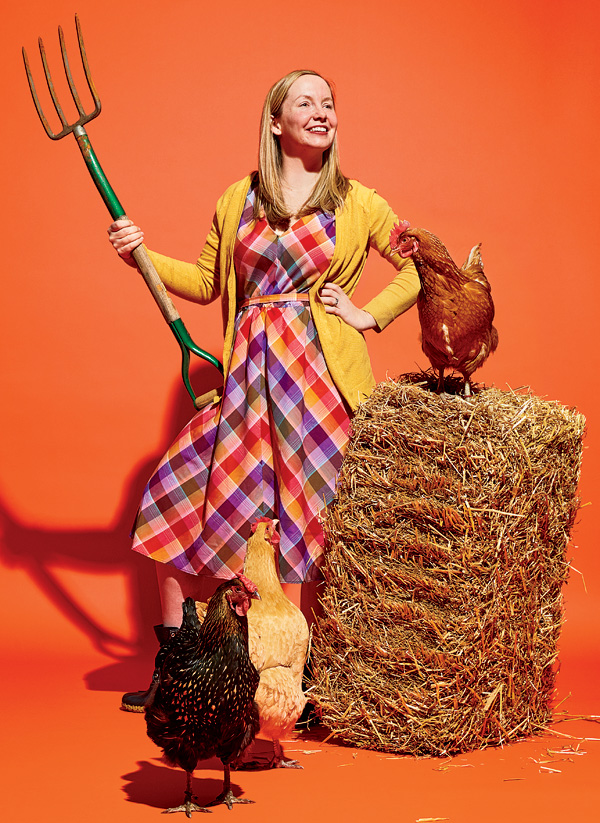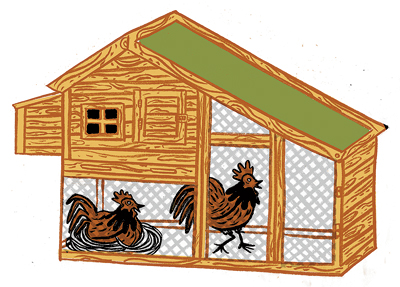
Backyard chickens are becoming a thing in Chicago. And why not? They’re perfectly legal, they require less care than a dog, they’re winter-tolerant, they provide endless amusement, and, best of all, they produce a daily supply of fresh eggs. All you need is a patch of ground—a typical Chicago postage-stamp yard is usually enough—and a modest investment for materials and feed. OK, getting your eggs from the store is undoubtedly cheaper—but you can’t put a price tag on the pleasure of raising your own fowl.

Prepare Their Home
1Make sure you’ve got the space. Budget for at least three square feet per bird inside the coop and 10 per bird for the run, the outdoor area where they roam. A backyard will suffice for that, so long as it’s fenced. But don’t skimp. “Chickens kept in tight quarters will absolutely turn against each other,” says Kelli Wefenstette (see above), who raises chickens in her Portage Park yard.
2Choose a coop. Simple wood coops from brands like Trixie and Pawhut typically consist of a protected roost and an additional enclosed space. They start around $150 online, but you can find a used one on Craigslist or through the Chicago Chicken Enthusiasts online group, which you can find via Google. Don’t splurge on a heated coop. Chickens’ feathers insulate them even against bitter cold.
3Buy a drinker and a feeder. These simple accoutrements can attach to the inside of the coop and cost as little as $10 at Belmont Feed & Seed (3036 W. Belmont Ave.).
4Give their feet a break. Chickens need a layer of soft, permeable material, or bedding, in the coop to absorb their droppings and, just as important, to keep their feet off the frozen ground in winter. Straw is the most popular type ($11 a bale at Belmont Feed & Seed).

Choose Your Chickens
1Go for pullets. Day-old female chicks cost $5 each at Belmont Feed & Seed, but they can’t be left outside right away. A better bet for the beginner: pullets, young chickens on the cusp of maturity. They cost around $25, but are ready to settle into their new home.
2Pick a breed (you’ll love the names). The ones that fare well on small Chicago lots include Silkie Bantams, Australorps, Plymouth Rocks, Orpingtons, Rhode Island Reds, and Wyandottes. Generally, chickens of different breeds will get along just fine in the same coop.
3Spring for a trio. A lonely chicken is a bored chicken and may turn to pecking herself, says Martha Boyd, moderator of the Chicago Chicken Enthusiasts site. Many experts suggest starting with three to six, which creates a sociable group and doesn’t leave you short-handed if one or two get sick or don’t lay many eggs.
4Hens only, please. Roosters aren’t illegal, but they’re pretty much guaranteed to provoke noise complaints from your neighbors.

Start Farming!
1Feed them (so they can feed you). Laying hens need a custom grain-protein meal ($18 to $28 for a 50-pound bag at Belmont Feed & Seed). Count on going through at least $35 worth of feed a month for three hens, though you can supplement their diet with table scraps such as fruit, veggies, fish, grains, and—gulp—eggs (the cooked kind).
2Let them roam. Chickens give so much yet ask so little. Wefenstette says to let them out of their coop in the morning and put them back in at night.
3Harvest your breakfast daily. In summer, you can expect an egg a day from each hen from the time they’re four to six months old until they’re between three and four years of age. They often quit laying in winter to conserve energy. Collect your eggs daily—if you don’t, the hens may peck at them themselves. “Once they get a taste for eggs,” says Wefenstette, “the habit’s hard to break.”
4Clean up and compost. Chicken bedding has to be changed. Wefenstette swaps hers out once a month. Unlike cat litter, it can’t just be flushed down the toilet. Fortunately, it makes outstanding compost.
5Plan for their retirement. You can keep your hens as pets once they stop laying or (no judgment here) have them slaughtered by a live poultry shop such as Alliance Poultry Farms (1636 W. Chicago Ave.); it’s illegal in the city to do it yourself.


